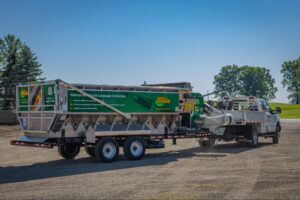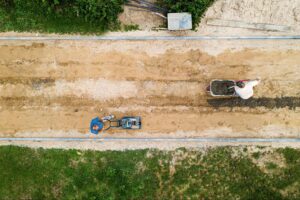The landscaping industry is undergoing a significant transformation. Challenges like labor shortages and generational shifts in worker expectations require businesses to rethink their approach to recruiting and retaining employees. In an era where physical labor once defined success, today’s workforce is increasingly drawn to opportunities that integrate technology, prioritize safety, and foster a dynamic, inclusive culture. This evolution underscores the importance of “landscaping industry talent attraction”—making landscaping jobs appealing to a new generation of workers who value forward-thinking processes and modern tools.
To succeed in this shifting landscape, companies must adopt innovative equipment and nurture a workplace culture that supports continuous learning and respect. These elements work hand in hand—advanced tools streamline processes while a positive culture boosts morale and engagement. Together, they create an environment that entices tech-savvy individuals and retains committed team members. By embracing innovation and placing employee well-being at the forefront, landscaping businesses can overcome staffing challenges while driving productivity and sustainable growth. Below, we explore how technology and culture shape the way landscaping companies attract and retain employees, offering practical tips to help them prepare for the future workforce.
The Current Labor Challenges in Landscaping
The landscaping industry faces several unique labor challenges. As many seasoned employees near retirement, there is a need to recruit younger workers who may be unfamiliar with the industry’s evolving practices. This generational gap can lead to misconceptions about landscaping being purely physical or low-tech. To attract a new wave of talent, employers must showcase the modern equipment and advanced methods that reduce strain and increase efficiency.
Seasonality further complicates workforce management. Landscaping work tends to peak in warmer months, while colder seasons often bring fewer jobs. Some businesses address this by offering year-round services, such as snow removal or debris collection, to increase the consistency of employment. In addition, younger workers—often motivated by environmental concerns—are pushing landscaping companies to incorporate sustainability measures like eco-friendly treatments, biodiversity protection, and advanced watering techniques. These green practices are a growing priority for both employees and clients, highlighting the demand for innovative solutions.
Another factor is safety and well-being. Landscaping jobs can be physically demanding, so measures that reduce manual labor and repetitive strain are pivotal. Government agencies like OSHA have guidelines for maintaining safety and compliance in landscaping operations. Companies that follow these best practices and offer ergonomic tools will not only protect workers but also enhance their reputation as responsible employers.
By acknowledging and directly addressing these hurdles, landscaping companies can reposition themselves to draw in a broader, more diverse workforce. The key lies in modernizing the perception of the job, aligning with sustainability goals, and ensuring workers feel safe and valued.
The Role of Technology in Modernizing the Landscaping Industry
Technology has emerged as a powerful driver of change in landscaping, helping businesses operate more efficiently and safely. Incorporating advanced machinery reduces the physical demands of labor, which aligns with the expectations of younger, tech-oriented employees. At the same time, it reshapes the traditional image of the profession, making it increasingly attractive to new talent.
A prime example is the Mulch Mule Trailer specs, designed to automate tasks like loading and unloading mulch, stone, leaves, and debris. Its large hopper and quick-discharge feature drastically reduce the manual effort involved. However, it is important to note potential drawbacks before implementing advanced equipment. For instance, the upfront investment and required training might initially slow operations, and additional maintenance costs can arise. Yet many landscaping professionals find that these challenges are outweighed by gains in productivity, as well as reductions in physical strain and long-term labor expenses.
Digital tools also lessen administrative burdens. Field service management software allows teams to organize schedules, optimize routes, and track project progress with precision. These platforms support real-time communication, enabling managers to monitor operations and allocate resources effectively. Over time, these efficiencies can bolster a company’s bottom line and elevate employee satisfaction, as workers devote more energy to meaningful tasks rather than exhausting manual labor.
With the push for sustainable and efficient practices, agencies like the U.S. Environmental Protection Agency (EPA) emphasize technology as a means to enhance ecological stewardship. Automated watering solutions, for instance, help minimize water wastage. This confluence of technology and sustainability resonates with younger workers seeking environmentally responsible employers.
How Technology Elevates Employee Satisfaction and Encourages Retention
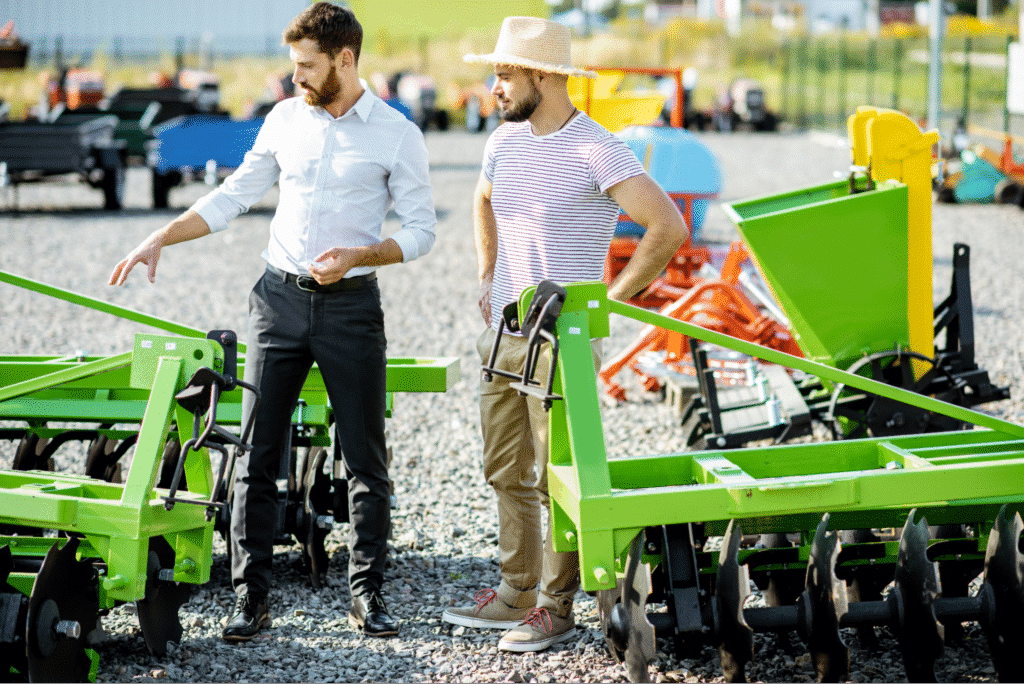
From automated equipment to real-time communication platforms, technology can be a game-changer for employee satisfaction. Tools that streamline repetitive tasks free up workers to focus on areas where they can exercise creativity and problem-solving—enhancing job fulfillment.
For example, automated material handling solutions can further reduce physical strain by handling specialized tasks. This approach significantly cuts down the likelihood of injuries. An emphasis on worker safety boosts morale by demonstrating an employer’s genuine care.
Additionally, digital applications, such as project management software, improve transparency and collaboration. They allow employees to see how their efforts contribute to overall progress, reinforcing teamwork and shared goals. This improved communication can reduce siloed workflows, minimize misunderstandings, and cultivate a sense of unity—a culture that appeals to modern workers.
When workers feel safer and more efficient, pride in their work increases, ultimately leading to greater loyalty. Integrating advanced tools signals to employees that the company invests in their well-being and professional development, laying a solid foundation for strong retention rates.
The Mulch Mule trailer, for example, is designed to transport and distribute soil, mulch, leaves, debris, stone and aggregate to save you time and money. With innovative features like the live floor system, curb-side discharge and powerful Honda GXi390 Engine, the Mulch Mule can do it all.
In the video below, Eberhardt Landscaping shares their experience with the Mulch Mule and working with Brown Equipment Company. Their leadership team talks about the solutions the Mulch Mule provides for them as a company and the increase in morale for their team.
Enhancing Workplace Culture to Attract and Retain Employees
Advanced landscaping technology alone cannot sustain a motivated workforce—cultivating a supportive workplace culture is just as vital. A positive culture fosters loyalty, trust, and a sense of belonging, offering employees solid reasons to stay for the long run.
Clear communication and collaboration form the backbone of a thriving culture. Regular team check-ins and feedback sessions foster openness, especially when discussing new processes or equipment like the Mulch Mule. Teams that understand why changes are made and how they benefit are generally more enthusiastic about adopting them. Furthermore, recognition programs—public shout-outs, small incentives, or milestone celebrations—build morale, especially if the leadership highlights achievements such as resourceful use of modern tools or safe, efficient project completion.
Diversity and inclusion add another layer to workplace culture. Accommodating employees from various backgrounds, providing language translation tools, and celebrating different perspectives can broaden the company’s problem-solving capacity. This inclusive spirit resonates with younger generations who view collaboration and respect as cornerstones of a desirable work environment.
Finally, safety consciousness sets a tone of genuine care. Regular training, protective gear, and strategic equipment investments all communicate that a company values the health of its workforce. When workers see consistent evidence of this commitment, they are more likely to dedicate themselves to the company’s success in return.
Empowering Employees with Training and Career Development
A common misconception is that landscaping jobs offer limited career prospects. In reality, thorough training and development paths can transform these roles into rewarding, long-term careers. Equipping employees with technical know-how, as well as soft skills like teamwork and leadership, expands their prospects and boosts retention.
Incorporating hands-on instruction with technology fosters confidence. New hires can start by learning the basics, then progress to more advanced operations. Alongside machinery training, programs focusing on communication, problem-solving, and conflict resolution are vital. Well-trained teams can complete projects faster and with higher quality.
Clear advancement pathways support employee growth. Multi-level training tracks, leading to supervisory or specialized roles, signal that the company is committed to their development. Offering credentials in sustainability, for instance, can align with environmental initiatives and provide meaningful milestones for career progression.
Ongoing education—through workshops or webinars—also ensures workers remain informed about emerging techniques and safety updates. By continually expanding employees’ skill sets, landscaping companies encourage long-term engagement and position themselves as progressive employers.
Aligning Technological Advancements with Workplace Culture
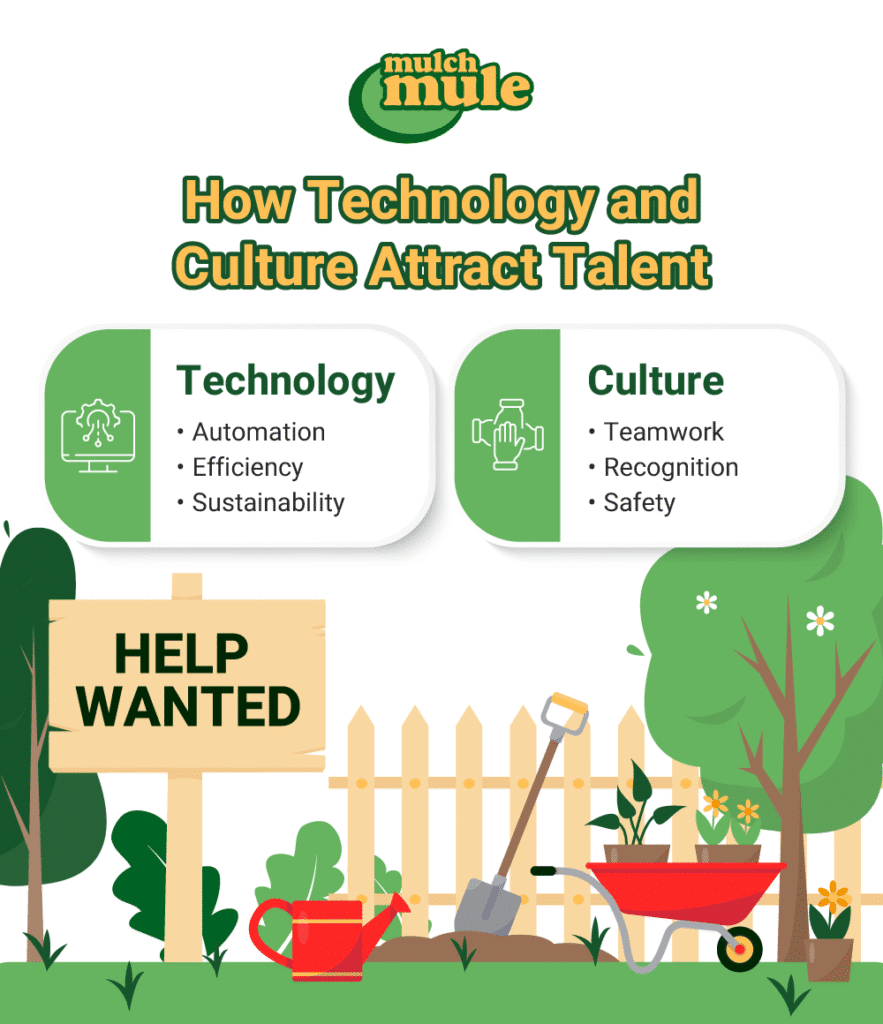
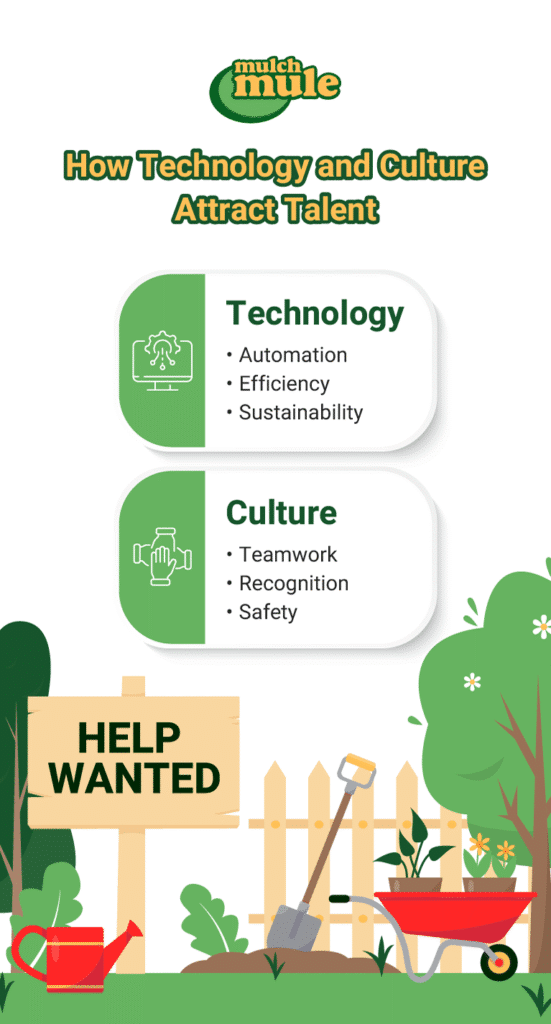
New technology works best when introduced into a supportive, well-informed environment. Equipment upgrades succeed only if employees are comfortable using them and understand their benefits. Informational sessions explaining how the machinery cuts down on labor-intensive tasks encourage buy-in and cooperation.
Leaders play an essential role in uniting innovation and culture. By demonstrating first-hand how to operate advanced equipment, managers model an openness to change and a willingness to learn. This hands-on approach builds trust and helps avoid the perception that new technology is forced upon employees without adequate support.
Regular refresher training ensures that workers remain confident with new tools. Constructive feedback loops allow staff to voice concerns, highlight improvements, and share success stories. Over time, these frequent check-ins integrate the equipment into routine operations and enhance the overall work experience.
The Value of Technology and Culture in Attracting Younger Talent

An essential factor in attracting new talent for your landscaping business is meeting the expectations of younger generations, who often seek employers committed to innovation and personal growth. With digital technologies being second nature to many Millennials and Gen Z workers, showcasing up-to-date equipment and streamlined workflows can significantly boost a company’s appeal.
Investing in forward-thinking tools highlights an organization’s dedication to worker safety and reliable operations. Such signals speak volumes to younger candidates, indicating that the employer values quality and takes steps to minimize downtime or frustration not just for customers, but also for the workforce.
At the same time, these employees often look for strong, values-driven workplace cultures. They want to be part of teams that prioritize open communication, diversity, and growth opportunities. By providing structured training, mentorship, and continuous development, landscaping companies can develop well-rounded employees who feel invested in the organization’s success. Furthermore, referencing ongoing industry developments through helpful resources can keep staff and leadership informed about emerging trends, fueling a culture of learning.
Attract New Talent for Your Landscaping Business with A Forward-Thinking Mindset
Balancing technological innovation with a people-centric culture is the key to thriving in the modern landscaping industry. Serving as an example, the Mulch Mule suite of equipment simplifies tasks and reduces physical strain—demonstrating that efficiency and worker well-being can go hand in hand. Meanwhile, fostering a culture of transparent communication, training, and mutual respect lays the foundation for true employee engagement and retention.
Landscaping companies that take decisive steps to integrate advanced technology, encourage professional growth, and celebrate their teams’ achievements will be best positioned to attract a new generation of committed landscaping professionals. For more insights on the innovative Mulch Mule trailer, reach out to discuss your needs and get a quote.


